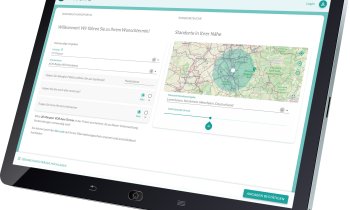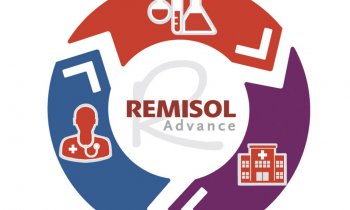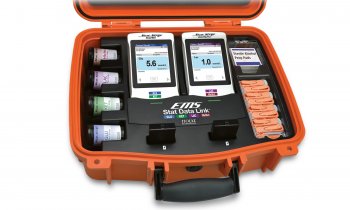Systems medicine
IT is a resource just like water or energy
Systems medicine – the interdisciplinary field incorporating biochemical, physiological and environmental interactions in the study of human body systems as part of an integrated whole – draws heavily on the technological advances in information technology (IT). New ways to use data impact on healthcare and society, says Professor Dr Heyo Kroemer, Dean of the Medical School, Georg August University, in Göttingen, Germany. ‘We live in times when many things undergo fundamental changes. New possibilities to use data may well herald the beginning of a new era in medicine.’
Interview: Sascha Keutel

Dr Heyo Kroemer: ‘Today, new analytical technologies allow us to collect highly complex data on diseases – and consequently to understand these diseases better. For example, it’s no longer particularly expensive to sequence a genome and identify genetic variants that may or might be disease-relevant. Similarly, we can have a comprehensive look at epigenetics, the modifications of all DNS structures; or, proteome technology allows us to view all proteins. When we use these new analytical procedures and combine them with bio-informatics, we will be able to understand diseases and processes to an extent that allows us to intervene far better.’
Exactly who or what drives systems medicine forward?
‘Many of my colleagues are convinced that the new technology is the driver but, frankly, I don’t think so. As far as I’m concerned it’s the demographic change that prompts us to act. Our ageing population, which naturally means people are sick more frequently, and immense medical progress, create a pressure towards the development of affordable and feasible solutions. ‘What we’ll see in the future is a triangle of many patients, few payers and a wide array of services made possible by medical progress. This triangle is a well-nigh insurmountable challenge for a healthcare system financed through solidarity-based mechanisms – if we don’t use modern technologies. One of these options is the system medicine approach, which will lead to physicians being able to predict individual courses of disease better. Medicine will become much more precise and much more specific.’
Thus the importance of constant exchange between clinicians, IT people, physicists and mathematicians…
‘Exactly. The systems medicine approach requires cooperation between physicians, specialists in analytical procedures, such as proteome analyses, and experts who mediate between physicians and analysts, who basically process data – the bio-informatics specialists. The success of systems medicine relies on the cooperation of these groups. Moreover, we need experts who deal with healthcare-related issues that cannot be solved within healthcare itself, such as legal or ethical issues regarding huge data volumes.’
‘Potentially, systems medicine also has significant social relevance. On the one hand it creates the preconditions for broad segments of the ageing population to be able to participate in medical progress. On the other, we already see today how Big Data can change our lives. Point in case: the availability of huge amounts of personal data on smartphones. ‘We know from the USA that the integration of these data into the patient record has already begun. This will allow people to be health-monitored around the clock and to analyse the data. The interaction between patients and Big Data and the impact this has on diagnostics and therapy has the potential to change our healthcare system fundamentally.’
How do you explain ‘Big Data’?
‘Big Data refers to data sets that are either too large or too complex to be analysed by conventional means. Note that complexity here is even more of an issue than size. I personally would classify Big Data in healthcare in three categories:
1. Conventional Big Data, meaning information from genome or transcription analyses
2. Unused Big Data, meaning information that is being stored for regular healthcare purpose
3. Private Big Data, meaning data, such as those generated by smartphones, which potentially could be used for health monitoring purposes.
In my opinion Big Data in healthcare is a potential research, and therefore knowledge, resource that is currently not being used and which we urgently have to tap.’
Is there European cooperation for this?
‘Many ideas are being discussed worldwide with regard to standardisation. The USA’s government has created massive incentives and invested significantly in electronic patient records and is now in the process of ensuring interoperability. While there is a lively international debate on standards, in Germany, unfortunately, we are lagging miles behind. In healthcare IT, be it with regard to research or provision of care, there are only very few cooperation projects. We hope there will be an increasing awareness of this issue, since I am utterly convinced that without these technologies we will not be able to master the demographic change in the healthcare system.’
‘We must change our idea of information technology. IT is a basic resource, just like water or energy. Thus it should not be an item we have to apply for in our individual project applications. IT should be available anywhere and there has to be the will to use or to be allowed to use untapped resources.’
Do patient rights come into play in this context?
‘That’s a crucial issue. As mentioned before, in modern healthcare there are a number of problems that concern healthcare but cannot be solved by healthcare alone, for example legal, ethical and participation issues. We absolutely must deal with these questions. For example: when I, as a patient, transfer my data via a smartphone to a certain system, such as an EPR in a hospital, it has to be clear beforehand who the owner of these data is.’
Are you afraid we will become ‘transparent patients’?
‘I recommend we don’t approach the issue driven by fear, but that we do a sensible and factual risk assessment: we recognise the positive potential, the risks and the potential for abuse, and we look at them carefully. At the end of the day it is a cost-benefit analysis. I think the benefits of using Big Data far outweigh potential drawbacks.’
PROFILE:
Professor Heyo Kroemer studied pharmacy at Braunschweig Technical University and, in 1992, received his postdoctoral lecture qualification (habilitation) in pharmacy and toxicology at Eberhard Karls University Tubingen. He was professor of pharmacology and toxicology at Ernst Moritz Arndt University Greifswald (1998-2012), Dean of the Medical School at University Hospital Greifswald (2000-2012) and is currently Dean, Chairman for Research and Teaching and Chairman of the Managing Board at the University Medical Centre Göttingen. Dr Kroemer is also President of the German Medical Faculty Association.
11.09.2015











